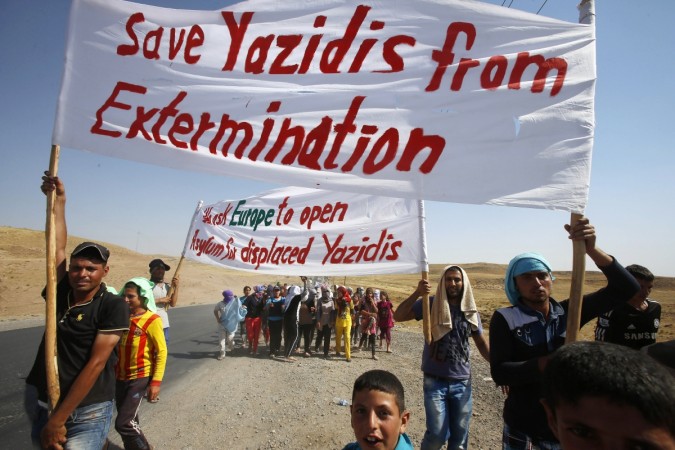
Members of the minority Yazidi sect in Iraq are demanding protection from the ISIS militants. (Reuters)
Anyone who has turned on a television news program over the last few months has likely been irritated by the non-stop mind numbing partisan bias broadcast by professional news organisations. The severe lack of any information on policy and general news in a time of deep political change globally adds to the further disservice to viewers and readers of modern journalism.
The real tragedy is that what could be considered the worst human rights abuse in the last few years has been taking place, with full knowledge of the atrocities being committed, and neither candidate has taken to openly discuss this issue in any detail.
Nadia Murad has been given a lot of attention by the UN in recent weeks. Nadia is a Yazidi survivor of ISIS. After escaping from her captors, she has chosen to become a voice to the world to help liberate her people, especially women and girls that are currently facing terrible violence.
Cases of rape against Yazidi and other minority groups committed by ISIS are documented in horrific detail. Two cases that stood out in recent reports was a girl of nine years of age being subject to repeated rapes daily.. Another story that emerged in U.S. media was of a survivor who chose to light herself on fire so she would no longer be subject to rape, either by dying or by making herself so unappealing that they would avoid her or execute her.
In the process of liberating Mosul from ISIS, accounts of Yazidi girls being moved early on to Syria have been reported. Minorities being used as human shields have been also been reported in several cases. While the U.S. Government had spent years doing the bare minimum to stop the genocide, the presidential campaigns—focusing often on women—have said little to nothing about helping these abused and tortured women. It could not simply be because it is 2016.
Fighting for recognition as human beings that deserve freedom from rape and torture has met a lot of resistance despite the world knowing almost everything about what has been occurring. Nadia Murad visited Canada recently to bolster an opposition party motion to help 300 rescued Yazidi girls be brought to Canada.
Despite the current government of Canada knowing full well of the atrocities and bringing in between 25,000 to 30,000 refugees on their own dime, it was estimated that they only brought in three Yazidi.
The appearance of Nadia Murad and months of pushing from local charity and action groups to save minorities in the region embarrassed the government to a sufficient degree that they finally accepted to help the first 300 girls. They were saved by Canadian organizations without any proper support.
Although the opposition parties and Canadian organizations have pushed to help Yazidis, it has been extremely difficult to get governments to even acknowledge the atrocities. At the end of the U.S. election, the president that addresses and handles this issue appropriately will have been the best choice.
A perpetuation of the status quo is a continuation of entrenching a society that does not see preventing genocide as a priority. That is the real choice for this current generation, and the best determinant of an issue that is worth a vote.